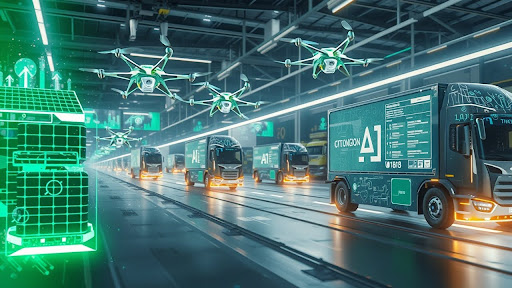Discover how AI supply chain management is transforming businesses by predicting disruptions, optimizing logistics, and building resilient supply chains. Learn the strategies industry leaders are using to stay ahead!
How AI Is Transforming Supply Chains
In today’s globalized and highly interconnected economy, supply chains form the foundation of commerce, ensuring that goods and services move efficiently from producers to consumers. However, unforeseen challenges such as natural disasters, pandemics, geopolitical instability, and climate change have exposed vulnerabilities in even the most robust supply chains. These disruptions can lead to delayed deliveries, increased costs, and customer dissatisfaction.
To combat these challenges, businesses are turning to Artificial Intelligence (AI) as a powerful tool to build supply chain resilience. By enabling predictive analytics, real-time monitoring, and intelligent automation, AI is helping organizations anticipate disruptions, optimize processes, and improve decision-making. This article delves into the critical role of AI in enhancing supply chain resilience, real-world applications, and the steps businesses can take to integrate AI into their supply chain management systems effectively.
What Is Supply Chain Resilience?
Supply chain resilience refers to a system’s ability to adapt, recover, and maintain operations during disruptions. A resilient supply chain is one that can not only withstand sudden shocks but also recover quickly, ensuring minimal impact on business operations and customer satisfaction.
Why Is Supply Chain Resilience Important?
Disruptions to supply chains can have far-reaching consequences, including financial losses, reputational damage, and loss of market share. For example, the COVID-19 pandemic caused widespread supply chain disruptions, leading to shortages of critical goods like medical supplies and semiconductors.
Building resilience involves three key pillars:
- Risk Mitigation: Identifying potential vulnerabilities and preparing contingency plans.
- Flexibility: Creating adaptive processes that can respond to changes in demand or supply conditions.
- Visibility: Ensuring transparency across all levels of the supply chain to monitor performance and detect potential issues in real time.
This is where AI plays a transformative role, offering tools and technologies that empower businesses to create robust, adaptive, and transparent supply chains.
How AI Enhances Supply Chain Management
AI is revolutionizing supply chain management by addressing critical pain points and enabling organizations to respond proactively to disruptions.
1. Predicting and Mitigating Supply Chain Disruptions
AI-powered systems analyze vast amounts of data from diverse sources, including weather forecasts, geopolitical news, and market trends, to identify potential risks.
- Example: AI can predict the impact of a hurricane on shipping routes or a geopolitical conflict on raw material availability.
- Impact: Businesses gain the ability to reroute shipments, find alternative suppliers, and adjust production schedules to minimize disruptions.
2. Enhancing Inventory Management
Maintaining the right inventory levels is a delicate balancing act. Overstocking increases holding costs, while understocking risks missed sales opportunities.
- How AI Helps: AI algorithms analyze historical data, demand patterns, and seasonal trends to optimize inventory levels.
- Result: Businesses can reduce excess inventory, prevent stockouts, and improve overall operational efficiency.
3. Real-Time Tracking and Logistics Optimization
AI provides end-to-end visibility into supply chain operations, enabling real-time tracking of shipments and dynamic route optimization.
- Use Case: AI systems can monitor traffic conditions, weather patterns, and fuel prices to determine the most efficient shipping routes.
- Impact: Reduced delivery times, lower transportation costs, and enhanced customer satisfaction.
4. Strengthening Supplier Relationships
Effective supplier management is critical for maintaining a stable supply base. AI evaluates supplier performance and identifies risks within the supplier network.
- AI Applications:
- Assess supplier reliability based on past delivery performance and adherence to compliance standards.
- Identify alternate suppliers in case of disruptions.
- Outcome: Improved supplier relationships and reduced dependency on high-risk suppliers.

The Benefits of AI in Supply Chains
AI brings several benefits to supply chain management, making it a cornerstone of modern chain management strategies.
1. Increased Visibility and Transparency
AI-powered tools offer real-time insights into supply chains, enabling businesses to monitor performance at every stage.
- Example: AI dashboards display live updates on inventory levels, shipment statuses, and supplier metrics, ensuring seamless communication between stakeholders.
2. Faster and Smarter Decision-Making
AI processes vast datasets in seconds, delivering actionable insights that empower managers to make informed decisions quickly.
3. Enhanced Risk Management
By predicting potential disruptions and suggesting contingency plans, AI minimizes risks and prevents costly delays.
4. Improved Sustainability
AI helps businesses optimize resource usage, reducing waste and energy consumption. This not only lowers costs but also aligns with environmental goals.
Real-World Applications of AI in Supply Chains
1. Walmart: Smarter Inventory and Demand Forecasting
Walmart uses AI to analyze sales data, predict demand patterns, and ensure optimal stock levels in its stores. This has reduced waste and improved customer satisfaction.
2. Amazon: Automated Fulfillment Centers
Amazon employs AI-powered robots in its fulfillment centers to sort, pack, and transport goods. This integration of AI with automation ensures faster order processing and delivery.
3. IBM Watson: Supply Chain Insights
IBM’s AI platform helps businesses gain visibility into their supply chains, monitor risks, and optimize workflows.
4. DHL: AI-Driven Warehousing
DHL uses AI to automate warehousing operations, including sorting, inventory tracking, and demand forecasting, leading to improved efficiency and reduced costs.
5. Maersk: Predictive Analytics in Shipping
Maersk leverages AI to predict delays in shipping routes, enabling better planning and on-time delivery.
Challenges in AI Supply Chain Integration
While the potential of AI in supply chain management is immense, businesses face several hurdles:
1. High Implementation Costs
Adopting AI requires substantial investment in technology, infrastructure, and expertise, which can be a barrier for smaller organizations.
2. Data Silos
Many businesses operate with fragmented data systems, limiting AI’s ability to provide comprehensive insights.
3. Skills Gap
Implementing and managing AI solutions requires specialized skills, which are often in short supply.
4. Ethical and Privacy Concerns
AI systems rely on extensive data collection, raising questions about data privacy and compliance with regulations like GDPR.

Future Trends: AI and the Evolution of Supply Chains
1. AI-Powered Autonomous Vehicles
Autonomous trucks and drones guided by AI will revolutionize transportation, reducing delivery times and operational costs.
2. Blockchain and AI Integration
Combining AI with blockchain will enhance transparency, ensuring tamper-proof records of every transaction and movement in the supply chain.
3. Decentralized Supply Ecosystems
AI will facilitate the creation of decentralized and adaptive supply ecosystems, reducing reliance on single suppliers or regions.
4. Collaborative AI Tools
Future AI tools will enable seamless data sharing among supply chain partners, fostering greater collaboration and joint problem-solving.
The Role of Research in AI Supply Chain Development
Academic research plays a critical role in advancing AI-driven supply chain management. Journals like the International Journal of Logistics Management and the International Journal of Production Economics provide valuable insights into emerging technologies and best practices. Businesses can leverage these findings to stay ahead in adopting innovative solutions.
Conclusion
The integration of artificial intelligence into supply chain management is no longer optional—it’s essential for businesses aiming to thrive in today’s unpredictable world. By enabling predictive analytics, real-time monitoring, and intelligent automation, AI empowers organizations to build resilient supply chains that can withstand disruptions and adapt to changing conditions.
From giants like Walmart and Amazon to logistics leaders like DHL and Maersk, real-world examples demonstrate AI’s transformative impact. However, to unlock its full potential, businesses must address challenges such as implementation costs, data integration, and skill shortages.
As industries evolve, adopting AI-driven strategies for enhancing supply chain resilience will not only provide a competitive edge but also ensure long-term success. Businesses that embrace this shift today will be better prepared to navigate future uncertainties and capitalize on emerging opportunities.
Take the Next Step
Ready to revolutionize your supply chain operations with AI? Take the AI Assessment at assessment.com to discover tailored solutions that align with your business needs. Build a future-ready, resilient supply chain with the power of AI today!
